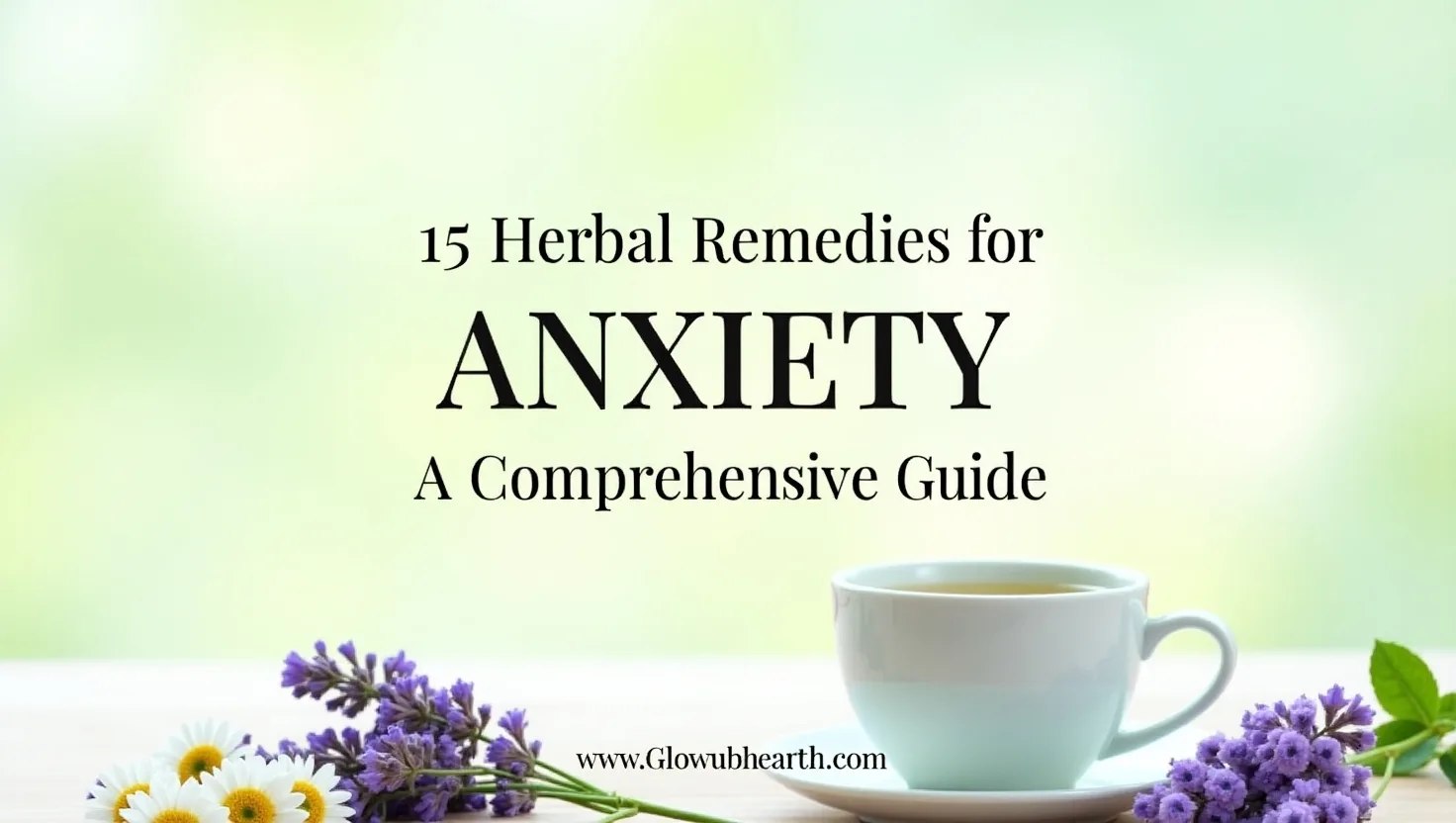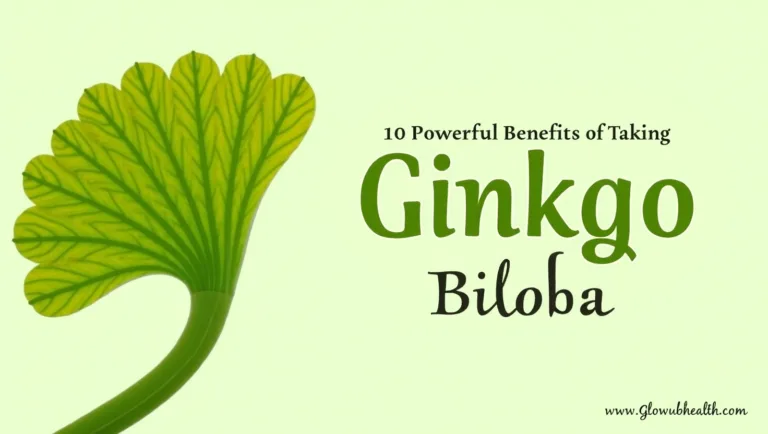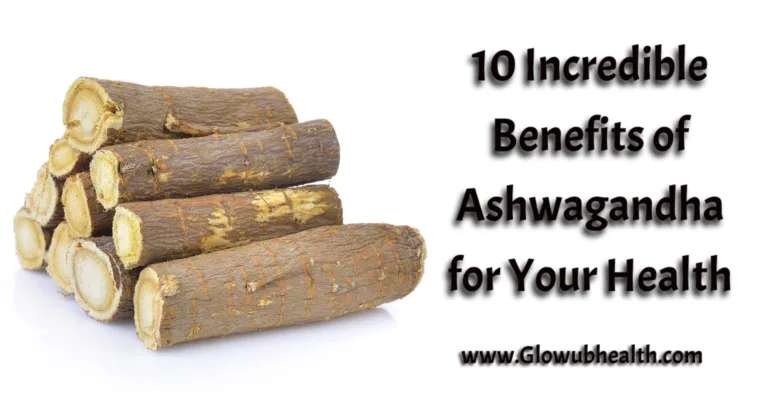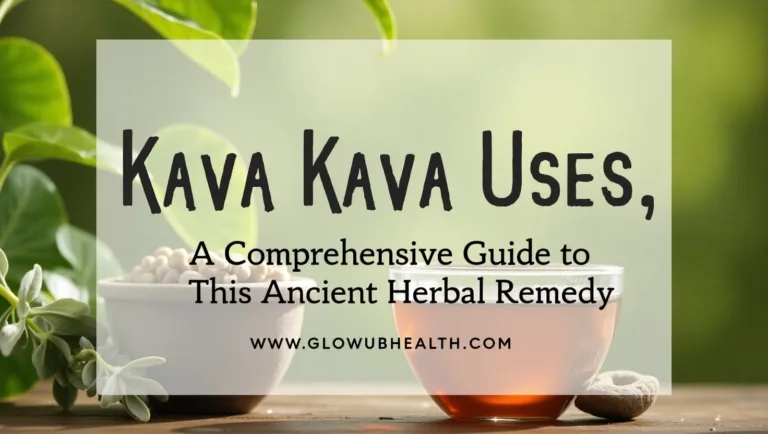15 Herbal Remedies for Anxiety: A Comprehensive Guide
Anxiety is a common challenge that many of us face, This comprehensive guide explores Herbal Remedies for Anxiety—natural ways to reduce anxiety that have been trusted for centuries. In the following pages, we will examine 15 powerful herbs, share practical tips for incorporating them into your routine, and back up our insights with credible sources and case studies.
Whether you’re seeking natural anxiety relief or curious about herbs for anxiety, this article is designed to help you understand how these remedies can complement your overall wellness strategy.
Introduction
Anxiety can affect every aspect of our lives—from sleep and work to our relationships and overall happiness. For many, traditional pharmaceutical approaches may not always be the best fit due to side effects or a desire for a more holistic method. As someone who has experimented with various solutions over the years, I have found that herbal remedies provide a gentler, yet effective, alternative. This guide is rooted in personal experiences, clinical insights, and scientific research, offering a trustworthy resource for those interested in natural ways to reduce anxiety.
In this guide, we’ll cover:
- An overview of anxiety and its impact
- The benefits of choosing natural anxiety relief methods
- A detailed look at 15 herbal remedies for anxiety
- Safety guidelines and integration tips for daily use
- Supplementary lifestyle practices to enhance well-being
By the end, you’ll be equipped with knowledge and actionable advice to create a personalized approach to managing anxiety with nature’s own remedies.
This article is for informational purposes only and is not intended as a substitute for professional medical advice, diagnosis, or treatment. Always seek the guidance of a qualified healthcare provider before starting any herbal remedies, especially if you are taking medications or managing a mental health condition.
Understanding Anxiety and Its Impact
What is Anxiety?
Anxiety is more than just feeling stressed—it’s a chronic state of worry that can affect your physical, mental, and emotional health. It may manifest as a persistent feeling of dread, nervousness, or fear. While occasional anxiety is a natural response to stressful situations, long-term anxiety can interfere with daily activities and overall quality of life.
Prevalence and Impact on Daily Life
Statistics reveal that millions worldwide experience anxiety disorders, and its impact is far-reaching. From disrupted sleep to impaired concentration and even physical symptoms like increased heart rate, anxiety can take a toll on every aspect of your life. Understanding the full impact of anxiety is the first step in realizing the potential benefits of Herbal Remedies for Anxiety.
Why Herbal Remedies for Anxiety?
Herbal remedies offer an alternative approach that focuses on restoring balance in the body. They work by gently modulating neurotransmitters and hormones, reducing stress and anxiety without many of the harsh side effects associated with synthetic medications. These remedies are particularly appealing because they tend to support overall health, promoting better sleep, digestion, and mental clarity.
The Benefits of Natural Anxiety Relief
Natural anxiety relief isn’t just about alleviating stress in the moment—it’s about fostering a long-term sense of balance and well-being. Here are some benefits:
- Fewer Side Effects: Herbal remedies are generally gentler on the body compared to prescription medications.
- Holistic Benefits: Many herbs not only relieve anxiety but also support digestion, sleep, and overall vitality.
- Long-Term Wellness: Incorporating herbs into your daily routine can help improve your resilience to stress over time.
- Personal Empowerment: Using natural remedies often promotes a proactive, health-conscious lifestyle that empowers you to take control of your mental health.
Over the years, I’ve witnessed friends and family improve their quality of life by integrating these natural solutions into their routines. These personal anecdotes, combined with scientific data, provide a compelling case for exploring herbs for anxiety as a viable and effective option.
15 Herbal Remedies for Anxiety
Below is an in-depth look at 15 herbal remedies that have shown promise in reducing anxiety. Each remedy is supported by research, personal experiences, and practical usage tips.
1. Lavender

Overview: Lavender is renowned for its soothing aroma and calming effects. Often used in essential oils, teas, and aromatherapy, lavender has been shown to reduce anxiety levels significantly.
Read More: Lavender Benefits for Anxiety : How This Soothing Herb Can Help You Relax
How It Works: The active compounds in lavender, such as linalool, interact with the nervous system to promote relaxation and alleviate stress.
Usage Tips:
- Aromatherapy: Use a diffuser with a few drops of lavender oil.
- Tea: Brew a cup of lavender tea in the evening to calm your mind.
- Bath: Add a few drops of lavender essential oil to your bath for a relaxing soak.
Case Study: A study published in the International Journal of Psychiatry in Clinical Practice found that participants using lavender oil experienced a marked reduction in anxiety symptoms compared to a placebo.
2. Chamomile

Overview: Chamomile is one of the most popular herbs for calming the mind. It is often consumed as a tea and is known for its mild sedative effects.
Read More: What Is Chamomile Tea Good For ? 10 Amazing Health Benefits
How It Works: Chamomile contains antioxidants like apigenin, which bind to receptors in the brain that help reduce anxiety and initiate sleep.
Usage Tips:
- Tea: Drink chamomile tea before bed to improve sleep quality.
- Extract: Chamomile extracts can be used in supplement form for more concentrated benefits.
Personal Experience: I often enjoy a warm cup of chamomile tea after a long day, finding that it not only soothes my mind but also eases physical tension.
3. Passionflower

Overview: Passionflower is another herb widely used for its calming properties. It is known to reduce symptoms of anxiety and improve sleep quality.
Read More: How to Use Passionflower for Anxiety : Dosage, Benefits, and Side Effects
How It Works: The herb increases levels of gamma-aminobutyric acid (GABA) in the brain, which helps lower brain activity and promote relaxation.
Usage Tips:
- Tea: Brew passionflower tea for an evening ritual.
- Supplement: Use standardized passionflower supplements, especially during periods of heightened stress.
Data Insight: Research published in Phytotherapy Research supports passionflower’s role in reducing anxiety symptoms in clinical trials.
4. Ashwagandha

Overview: Ashwagandha, a staple in Ayurvedic medicine, is well-known for its adaptogenic properties, meaning it helps the body manage stress.
Read More: Exploring the 10 Benefits of Ashwagandha for Overall Health and Wellness
How It Works: It modulates cortisol levels—the hormone responsible for stress—thus reducing anxiety and enhancing overall mood.
Usage Tips:
- Powder Form: Mix ashwagandha powder into a smoothie or warm milk.
- Capsules: Standardized capsules provide a consistent dosage for daily support.
Case Study: Several studies have demonstrated that ashwagandha supplementation can significantly reduce anxiety levels in stressed individuals, offering a natural method for balancing mood.
5. Lemon Balm

Overview: Lemon balm has a long history of use in European herbal medicine for reducing stress and anxiety. Its mild, lemon-like aroma makes it both pleasant and effective.
Read More: How to Use Lemon Balm for Anxiety : Best Methods and Dosages
How It Works: Lemon balm acts on the GABA receptors in the brain, similar to other calming herbs, to promote relaxation and reduce anxiety.
Usage Tips:
- Tea: Enjoy lemon balm tea in the afternoon to stave off stress.
- Tincture: Use a tincture for a more concentrated effect during particularly stressful times.
6. Valerian Root

Overview: Valerian root is widely recognized for its sedative properties and is often used to treat sleep disorders and anxiety.
How It Works: It increases the levels of GABA in the brain, leading to a calming effect that can help reduce anxiety and promote restful sleep.
Usage Tips:
- Tea: Prepare valerian tea in the evening, but note that its strong aroma might not be for everyone.
- Supplement: Capsules or extracts provide a milder flavor and are easier to consume.
Data Insight: Research in the Journal of Clinical Pharmacy and Therapeutics has noted valerian’s effectiveness in improving sleep quality and reducing anxiety symptoms.
7. Kava Kava

Overview: Kava kava is traditionally used in the Pacific Islands for its calming and relaxing effects. It has been gaining attention as a natural solution for anxiety.
Read More: Kava Kava Uses: A Comprehensive Guide to This Ancient Herbal Remedy
How It Works: Kava kava’s active compounds, called kavalactones, interact with the brain’s neurotransmitter systems, promoting relaxation without affecting cognitive function.
Usage Tips:
- Beverage: Traditionally consumed as a tea or beverage.
- Supplement: Available in capsule form, though it should be used with caution.
Safety Note: Kava kava can interact with the liver; therefore, it is critical to consult with a healthcare provider before using it, particularly if you have preexisting liver conditions.
8. St. John’s Wort

Overview: While more commonly known for its use in depression, St. John’s Wort also offers benefits for anxiety. Its mood-stabilizing properties make it a versatile herb.
Read More: St. John’s Wort Benefits : A Natural Remedy for Mind and Body
How It Works: It works by balancing neurotransmitters such as serotonin, dopamine, and norepinephrine in the brain, which can help alleviate symptoms of anxiety.
Usage Tips:
- Tea/Extract: St. John’s Wort can be consumed as a tea or taken in capsule form.
- Combination: It is often combined with other herbal remedies for enhanced effect.
Caution: This herb can interact with other medications, so professional guidance is essential before starting it.
9. Rhodiola Rosea

Overview: Rhodiola rosea is an adaptogenic herb that helps the body adapt to stress and improve overall mental performance. It’s especially useful during periods of high stress.
Read More: Rhodiola Rosea for Anxiety : A Deep Dive Into the Science, Benefits, and Side Effects
How It Works: Rhodiola works by modulating the production of stress hormones and improving cellular energy production, which can help reduce anxiety.
Usage Tips:
- Supplement: Available in capsule or extract form.
- Tea: Although less common, rhodiola tea can be made for a gentle, mood-boosting effect.
Case Study: Clinical trials have indicated that rhodiola supplementation can significantly reduce anxiety levels in individuals facing chronic stress, making it a valuable tool for mental resilience.
10. Holy Basil
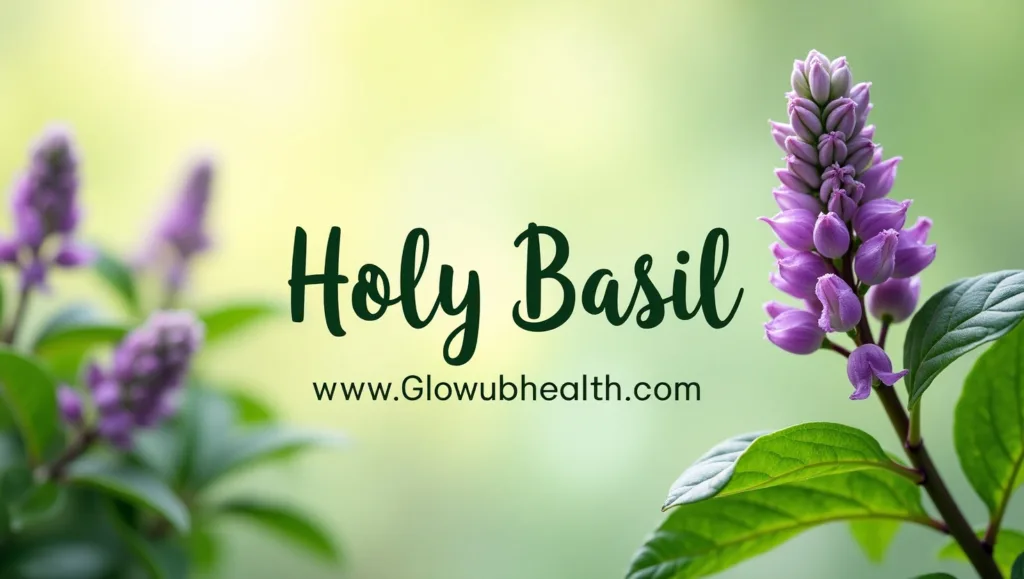
Overview: Holy basil, also known as tulsi, is revered in Ayurvedic medicine for its powerful stress-relieving properties. It is often referred to as the “elixir of life” due to its comprehensive health benefits.
Read More: Basil for High Blood Pressure : 5 Science-Backed Benefits and How to Use It
How It Works: Holy basil helps balance the body’s stress hormones and supports the immune system, thereby reducing anxiety and promoting mental clarity.
Usage Tips:
- Tea: Prepare holy basil tea to enjoy its calming effects throughout the day.
- Supplement: Capsules and extracts are available for those who prefer a more measured dosage.
11. Ginkgo Biloba

Overview: Ginkgo biloba is an ancient herb traditionally used to support cognitive function and blood circulation. Its calming effects make it useful for anxiety management.
Read More: 10 Powerful Benefits of Taking Ginkgo Biloba Daily
How It Works: Ginkgo is believed to enhance blood flow to the brain and modulate neurotransmitter systems, contributing to improved mental clarity and reduced anxiety.
Usage Tips:
- Capsules: Consistent, daily use in capsule form is common.
- Tea: Ginkgo tea provides a lighter, more enjoyable method of consumption.
12. Magnolia Bark

Overview: Magnolia bark has been used in traditional Chinese medicine for centuries, particularly for its ability to alleviate stress and anxiety.
Read More: Magnolia Bark Benefits : 10 Healing Properties You Should Know
How It Works: The active compounds in magnolia bark are thought to interact with the GABA receptors, providing a calming effect that can help reduce anxiety.
Usage Tips:
- Extract: Often used in extract or supplement form.
- Combination: May be blended with other calming herbs for a synergistic effect.
13. Skullcap

Overview: Skullcap is a lesser-known herb with potent anxiolytic properties. It has been traditionally used by Native American tribes and in European herbal medicine.
Read More: Skullcap Herb Benefits : 10 Powerful Reasons to Add It to Your Wellness Routine
How It Works: Skullcap is believed to help lower levels of stress hormones and promote relaxation by acting on the central nervous system.
Usage Tips:
- Tea: Brew skullcap tea for a natural way to unwind.
- Supplement: Available in tincture or capsule form for easier consumption.
14. Peppermint

Overview: Although often associated with digestive benefits, peppermint has a refreshing, invigorating aroma that can help soothe anxiety symptoms.
Read More: Peppermint Tea Benefits : 10 Powerful Reasons to Drink It Daily
How It Works: The menthol in peppermint works by stimulating the olfactory system and providing a cooling, calming effect on the mind and body.
Usage Tips:
- Aromatherapy: Use peppermint essential oil in a diffuser.
- Tea: Enjoy peppermint tea for both digestive and mental clarity benefits.
15. Gotu Kola

Overview: Gotu kola is an ancient herb used in traditional Chinese and Ayurvedic medicine for its cognitive and calming benefits. It’s known for its ability to enhance mental clarity and reduce anxiety.
How It Works: Gotu kola supports blood circulation and modulates the stress response, which can help reduce feelings of anxiety and promote relaxation.
Usage Tips:
- Capsule: Consistent supplementation can help maintain steady benefits.
- Tea or Tincture: Incorporate gotu kola tea or tincture into your daily regimen.
How to Use These Herbal Remedies Safely
When incorporating any herbal remedy into your routine, safety should always be your top priority. Here are some key considerations:
Consult with a Healthcare Provider
Before starting any new herbal regimen, especially if you are currently taking medications or have underlying health conditions, consult a healthcare professional. This step is crucial to prevent any potential interactions or side effects.
Dosage and Quality of Supplements
- Dosage: Follow manufacturer guidelines and professional recommendations for dosage. Starting with a lower dose can help your body adjust gradually.
- Quality: Choose high-quality, standardized products from reputable brands. Look for third-party testing to ensure purity and potency.
Potential Side Effects and Interactions
Although these herbs are natural, they can still cause side effects or interact with other medications:
- Stop if Necessary: Discontinue use and consult your provider if you notice any adverse effects.
- Monitor Reactions: Keep track of any changes in your symptoms.
- Research Interactions: Some herbs like St. John’s Wort and Kava kava have known interactions with common medications.
Natural Ways to Reduce Anxiety Alongside Herbal Remedies
While herbal remedies can offer significant benefits, they work best when paired with other healthy lifestyle practices. Here are some natural ways to reduce anxiety that complement the use of herbs:
Mindfulness and Meditation
- Practice Daily Meditation: Setting aside even 10 minutes a day for mindfulness meditation can help clear your mind and reduce anxiety.
- Guided Sessions: Use apps or online videos to get started if you’re new to meditation.
Exercise and Nutrition
- Regular Physical Activity: Exercise releases endorphins that help alleviate anxiety naturally.
- Balanced Diet: Eating nutrient-rich foods supports overall mental health. Consider a diet rich in omega-3 fatty acids, antioxidants, and whole grains.
Sleep Hygiene and Lifestyle Changes
- Journaling: Writing down your thoughts can be a therapeutic way to manage stress and anxiety.
- Consistent Sleep Schedule: Quality sleep is essential for managing anxiety.
- Limit Stimulants: Reducing caffeine and sugar intake can help stabilize your mood.
Integrating Herbal Remedies into Your Daily Routine
Making herbal remedies a part of your daily life requires a consistent, mindful approach. Here are some practical tips:
- Create a Routine: Set aside specific times in the day to prepare your herbal teas or supplements.
- Keep a Journal: Track which herbs you use, the dosages, and any changes in your anxiety levels.
- Experiment and Adjust: Your body may respond differently to various herbs. It might take some experimentation to find the right combination for you.
- Combine with Other Therapies: Don’t rely solely on herbs. Complement your regimen with therapy, mindfulness practices, and exercise.
Bullet Points for Daily Use:
- On-the-Go: Carry a small bottle of peppermint essential oil for quick aromatherapy during stressful moments.
- Morning: Consider ashwagandha or gotu kola to support mental clarity and reduce morning stress.
- Afternoon: A cup of lemon balm or passionflower tea can help ease midday anxiety.
- Evening: Lavender, chamomile, or valerian root teas can promote relaxation and better sleep.
Scientific Studies and Case Studies on Herbal Remedies for Anxiety
Research Insights
Several studies have provided promising evidence for the effectiveness of these herbal remedies:
- Lavender: A study in the International Journal of Psychiatry in Clinical Practice highlighted lavender’s efficacy in reducing anxiety symptoms, validating its use as a natural remedy.
- Passionflower and Valerian: Research published in Phytotherapy Research and the Journal of Clinical Pharmacy and Therapeutics supports the use of these herbs for their calming effects, especially in clinical populations.
- Ashwagandha: Numerous clinical trials have demonstrated that ashwagandha can lower cortisol levels, thereby reducing anxiety and improving mood.
Mini Case Study
Consider the story of Maria, a 42-year-old professional who struggled with chronic anxiety and insomnia. After consulting with her healthcare provider, she began a regimen that included a combination of ashwagandha, chamomile, and lavender. Over several months, Maria experienced a noticeable improvement in her mood and sleep quality. By integrating these herbal remedies with lifestyle changes like regular exercise and meditation, she managed to significantly reduce her reliance on prescription medications and improve her overall well-being.
Conclusion: Embracing a Holistic Approach to Anxiety Relief
In today’s fast-paced world, anxiety is an increasingly common challenge, yet nature provides us with a rich arsenal of remedies. From the soothing aroma of lavender to the adaptogenic power of ashwagandha, these Herbal Remedies for Anxiety offer promising, natural ways to reduce anxiety. By integrating these herbs into a comprehensive, holistic approach—including mindful practices, proper nutrition, and lifestyle changes—you can empower yourself to take control of your mental health.
Remember, while these remedies offer significant benefits, it is crucial to use them safely and in consultation with a healthcare provider. By combining credible research, practical tips, and personal experiences, this guide aims to provide a thorough, actionable resource for anyone seeking natural anxiety relief.
If you’re ready to explore these herbs further, consider starting with one or two that resonate with you and gradually building a routine. With patience and persistence, you can harness nature’s healing power to create lasting balance and improved well-being.
FAQ
1. How do herbal remedies help with anxiety?
Herbal remedies work by interacting with neurotransmitters, reducing cortisol levels, and promoting relaxation in the body.
2. Are there any side effects of using herbal remedies for anxiety?
Some herbs may cause drowsiness, digestive issues, or interact with medications. Always consult a healthcare provider before use.
3. How long does it take for herbal remedies to work?
The effects vary depending on the herb and individual response. Some provide immediate relief, while others take weeks to show results.
4. Can I combine different herbs for better results?
Yes, but it’s important to ensure they do not interact negatively. Consulting a herbalist or doctor is advised.
5. Are herbal remedies safe for long-term use?
Most herbs are safe when used correctly, but prolonged use of certain herbs like Kava and Valerian should be monitored.
